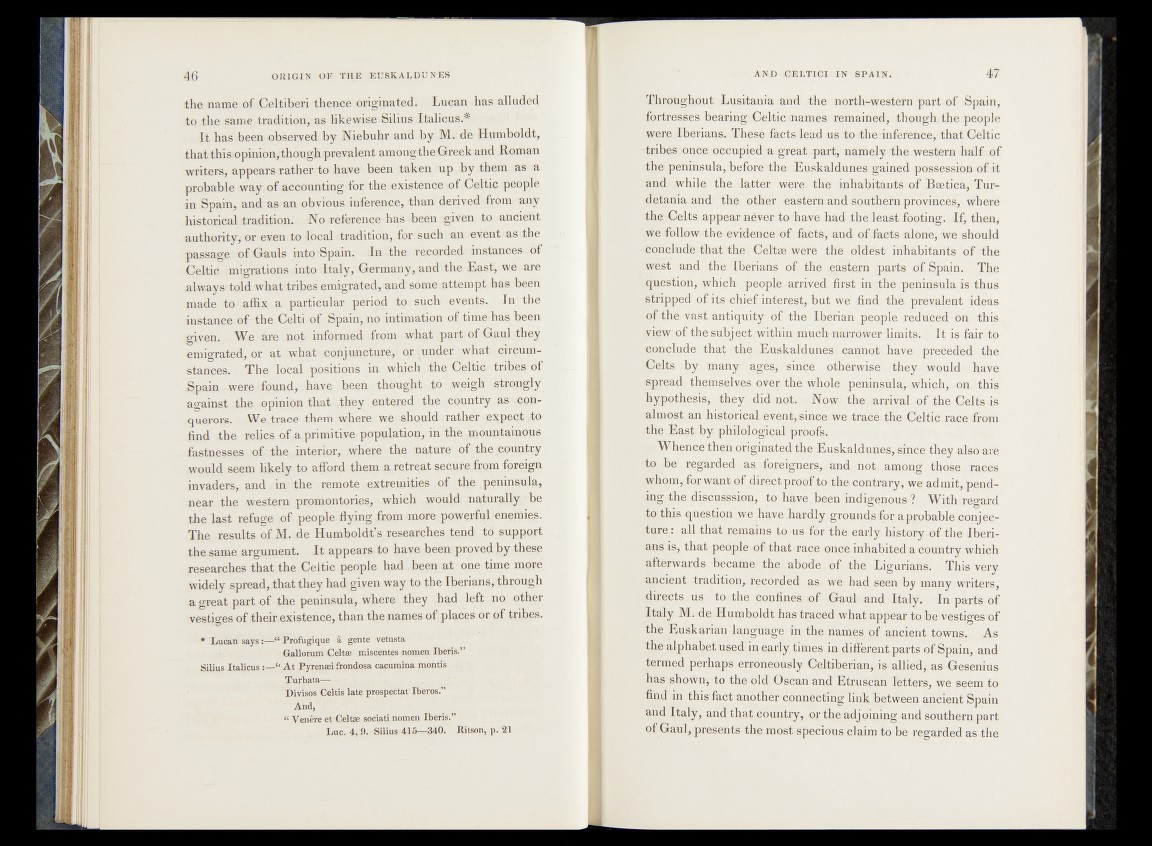
the name o£;!Cfel,laferil tbenee originated. Lucan fias alluded
to the same tradition, us fifcgw^^iïiajIJfcaUcni.* *
I t has been observed by Hiebuhr and by M. de Humboldt,
ithatthistopânionÿüiêagb^resàlent among &eGreekaaad Homan
writers, appears ràtherd;© bave been taken m p ,by-them as a
probable way of accounting Tor th e ,existence, of. Celtic people
in Spain, and as an obvioi® inference, than derived^H@m an$
historicaltradition, * *No reference has been given to ancient
authority, nr « a ; to IbcalltmditiàBÿ for; such an. event ;as<:fche
passage of Gauls into Spain. In ..tlm«rénorfsdM4nstances- of
Celtic migrations unto Italy, Germanyyandt therEastywe are
alwayedold what trihesenngfcated, and' sonieiattempt bps b®eb
made to affix ^.particular period to such events. In -the
instance ef-fhe Gelti ©f Spain, no intimation of timeffias b^fen
given. We are pot informed from what part of-Gnql 4)iey
emigrated, or at whatv conjianctfire,' or finder what d&eum-
The local positions in which ©1
Spain were found, have been thought -, to
the-opinion that (t|ppty entqned the '^pqntry as •£#*•
/Cjuei’ors. ' We.trace them where we should .rather je^peqt do
find the relics t^.primitrise^populatip^ indhe^ip^aiit^PQhP
jastnafsçs nf the interior» .where Hbe mature .of the .county
would seem likely to afford them a retreat ^ c p rn f^ J o re ig n
invaders, and in the remote extremities ,of the penipsujp.,
near ,the fWestern pronaonl^ries, which iW©ukl naturally,'be
the last i^pge-f«fi'péop[ê'Hyjpg fi»ni
The results of M. de Humboldt’s researches tend td snppqrt
the same argument. I t appears, to have been; prpye,d|>y these
researches that the.Celtic people had -been at one time mpre
widely spmad, that they had; given wpy to the Iberians* through
a great part of the peninsula, where ffiey had le£t >n,p othçr
vestiges of their existence, than the names of, places or of tribes.
* Lucan says Profugique à gente vetusta
Gallomm Celtæ miscentps nonapn Ibens.”
Silius Italicus V j r a t a à ù e i p ü m cacumina, mouds ’
. Turbata— -;
Divisos Celtis làte prospectât" Iberos.*’
And,
« Vendre e.t Çeltge sociati nomen Iberis.” ;
Luc. 4, ^. -Silius- 415—340. Ritson, p. 21
Throughout Lusitania and the north-western part of Spain,
fortresses bearing .Celtic names remained, though the people
were {Iberians. These .factsdead us rto theiihference, that Celtic
tribes oimekotecwpied a great .part, namely the western half of
the peninsula,^before the iEuskaldunes;gained possession of it
and while the latter were tbu&> inhabitants of Bsetica, Tur-
detania;and the/ofher eastern and southern provinces, where
the •C.el-ts.appear n^ vert©, ihasvjevhad.the least footing.; If, then,
we follow the jevidenc@’'0f'; tacts,' and of facts alone, we should
boffclndfe th a t the *@§1$^ were the dlffe-kt inhabitants of the
west/and-theTberians^of Uae ,e^tern .parts of. Spain. The
^HUdstion, which- people arrived first in the* peninsula is thus
stripped ofdts cbtefdnterest, biff we find the prevalent ideas
of.ifhe. yast antiquity;<pffit-he Iberian people reduced on this
sview of .th© suhj.|c;%within,much'harrower. Emits. It is fair to
-exclude ;.that the Euskaldunes cannot have preceded the
■^^ltsv^y^many^gMljjlsince other-wise;, they,-would havf;
^pea,d, %^^Lye^aY^|Lthe. whole peninsula, whichp,;on this
Hypothe|is, % e y ^ id .m g C ^ 0>w the arrival pfithe Celts is
almost an historical eyen%.since we trace, the Celtic race from
the East by philq|^gi|M proofs.
^iWhence t^en originated- the Eu skald apes, sine ©they also are
t# ||ei. .regarded foiffjgnefs,. and,hot-, .ampiig thqse races
whom, for wanf of di^ctp^olito^the contrary, we admit, .pendin
g the. discussion, to have ,been indigenous ?-' With regard
to this questipn-^e* have hardly-gsounds^or a probable conjjec-
itm^e :,jall that remains toms for the early history of the Iberians
is, that people ©fs-that racennoe inhabited a eountry which
•afterwards became the abodettfff the LiMrians. This very
ancient tradition, .recorded as we. had seen by many writers,
directs us "to the confines of Gaul and Italy,* In parts of
Italy M|de Humboldt has traced what appear to beWestiges of
the Euskarian language in the names offancient towns. As
the alphabet used in. early times in different parts of Spain, and
termed perhaps erroneously Geltiberian--is allied, as Gesenius
has shown, to the oldfQsean and Etruscan Betters, we seem to
find in this fact another edrinefeting link between ancient Spain
and Italy, and that pffuntry, or the adjoining and southern part
of Gaul, presents the most speeious claim to be regarded as the